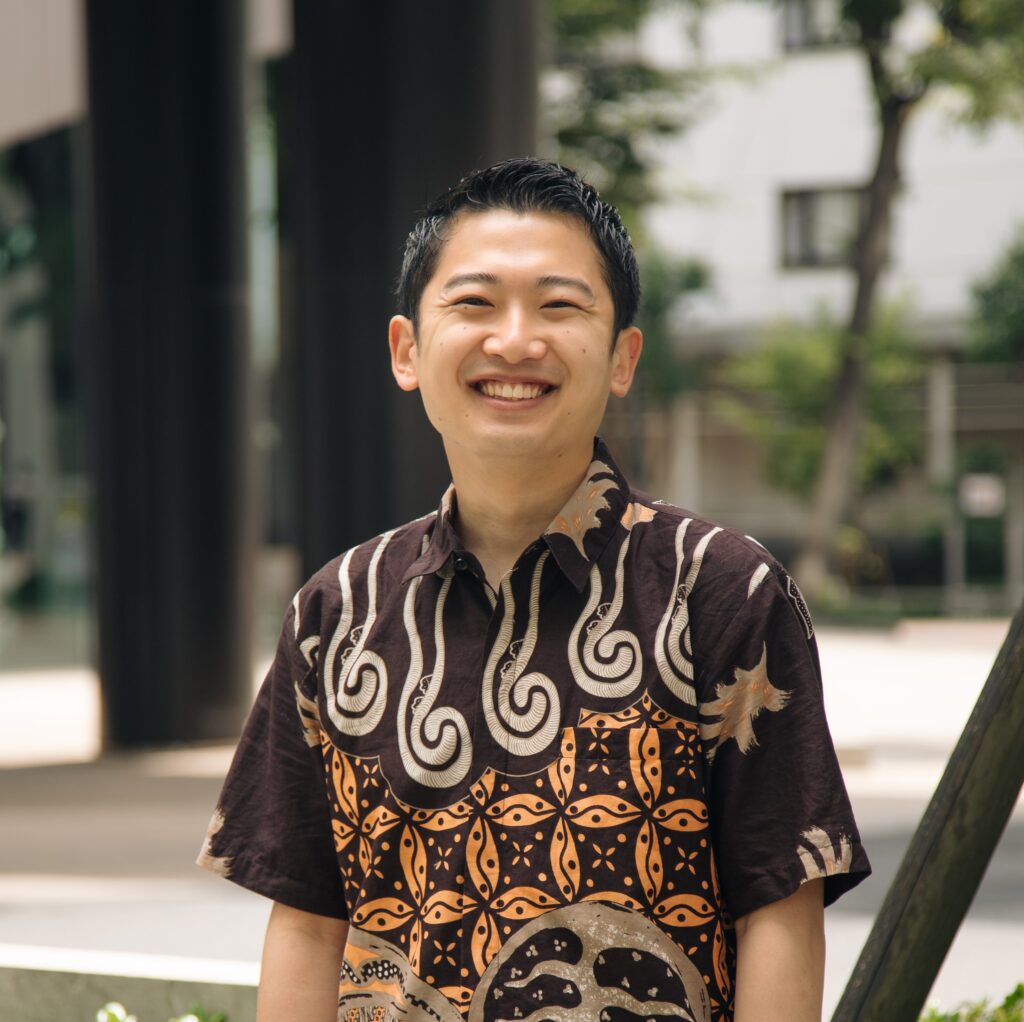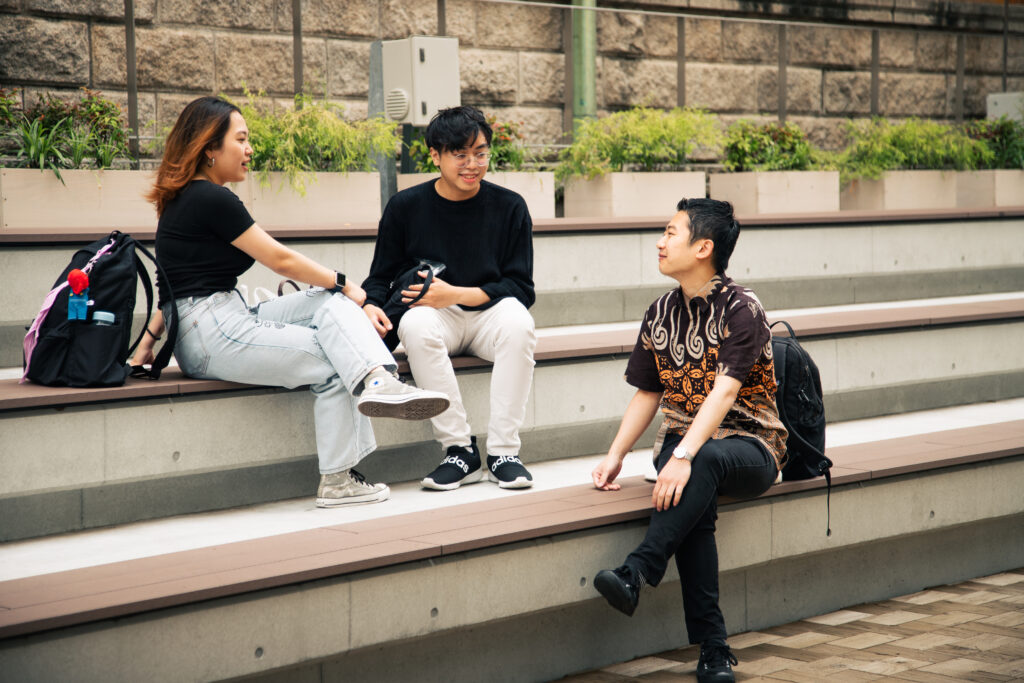Understanding others to understand oneself. How my encounter with Indonesia changed my future trajectory

“Without the encounters I had at the international dormitory, I would not have discovered what would eventually become my research topic,” says Yuga Orita, a graduate student at the Graduate School of Global Studies hailing from Hyogo Prefecture. As an international dormitory resident since his undergraduate years, what has he gained from his time in this international setting, and what are his goals for the future?
Sophia University: where the pursuit of one’s interests and diving into unknown fields go together
In high school, I was interested in international politics and area studies. My decision to attend Sophia University was heavily influenced by the ability to access a wide variety of the fields and majors that I was interested in all at one centrally located campus. I felt as though Sophia University would allow me to expand my future possibilities by exposing me to a wide variety of academic fields. As an undergraduate student, I took classes in other faculties, and this not only expanded my interests but also provided me with a very broad range of knowledge in many areas.
As a native of Takarazuka City, Hyogo Prefecture, it took some courage to attend a university in Tokyo, but I believe this choice contributed to my personal growth. Compared to the Kansai region, Tokyo has more visitors from all over Japan and the world, providing me with more opportunities to meet those with values and ways of thinking that are completely different from my own, which has greatly broadened my horizons.
If I was going to leave the place where I was born and raised and persevere in this new environment, I wanted to make sure I lived in an environment that challenged my personal growth to the greatest extent – that is when I came across the International Dormitory. While I moved into the dormitory with hopes of being able to communicate in English and make friends from other countries, I gained these experiences and more than I could have ever imagined.
By getting to know others, we can better understand ourselves.

Although I moved into the international dormitory with the desire to conduct daily life in English, I naturally struggled from the start to do so. Daily life and dormitory resident meetings are conducted almost entirely in English, and I struggled to accurately express my thoughts and feelings. At times it was frustrating to not be able to communicate as I wanted or with ease, but this experience was essential to not only develop language skills but also to better understand how to persevere through challenges.
While there have been hard times, I have also had more happy memories than can be counted. My favorite parts of dormitory life are those with friends after classes; chatting at night with people of different backgrounds and ages was both exciting and a way to wind down from the day. This is truly one of the best parts of dormitory life that can’t be experienced while living alone.
While living in this environment, I was also reminded time after time of the importance of understanding others. Through meeting those different from ourselves, we can understand our own thoughts and the things we take for granted. Sophia University’s motto is “For Others, With Others” but if you don’t get to know others, you won’t know what you can do to help them. If you don’t know yourself, you don’t know what you’re capable of doing to help other people. That is why I believe it is invaluable to be given the opportunity to reflect on my values and goals through my encounters with people from diverse backgrounds, and try to understand their experiences, and knowledge that is different from my own.
It is difficult to sum up the appeal of the international dormitory in a few words, but I think its biggest draw for students is the deep, life-lasting friendships that can be built there. In addition, with so many international students from countries and regions all over the world, the ability to learn about other cultures in depth while still in Japan is an unmatched feature of the dormitory.
The international dormitory encounter that led me to my research on Indonesia
As an undergraduate, I studied Indonesian politics at the Faculty of Global Studies. Since entering graduate school, I have been focusing my research on religion in Indonesia, particularly the relationship between majority and minority religions, as part of the Master’s Program in Area Studies. My interest, and ultimate decision to study Indonesia, was born out of an interaction I had with an Indonesian exchange student who I met at the international dormitory. He was the first dorm resident I met upon moving in, and after meeting, I began to frequently interact and develop great friendships with the dormitory’s Indonesian community. While first drawn to their gentle demeanors, I began to develop a deep interest in their country as well.
The 2019 Indonesian presidential election, in particular, left a lasting impact on me as I was exposed to discrimination and conflict within Indonesia that I hadn’t recognized before. Above all, I was amazed to see how students, not much older than myself, were able to passionately discuss the politics of their home country. Being able to understand the inner workings of Indonesia from Japan, and the gap between the calm demeanor of Indonesian people versus the discrimination and conflict that occurs in their society, a strong curiosity grew inside me and as a second-year undergraduate student, I decided I wanted to focus my studies on Indonesia. If it were not for my encounter at the international dormitory, I would not be where I am today: a graduate student specializing in Indonesia.
My interest in religion developed against the backdrop of a Catholic middle and high school education. As I moved on to higher education and met many priests and Catholics at Sophia University, my interest in Catholicism deepened. My current research is into Indonesia’s Catholic Church, focusing specifically on the position of Catholics, a religious minority in Indonesia, in society and the nature of the religious community.
In Japan, religion is often perceived as something that is important or relevant to only one segment of society, but in Indonesia, religion is a customary element deeply rooted in daily life for all. Therefore, I began to think that there was merit in researching the types of social conflict existing in areas where religion is widely practiced, whether there are things that people in conflict can collaborate on, and what the relationships between people in conflict structures are like.
Although I’ve just begun my research, I’ve realized that understanding others and oneself is a fundamental aspect of study. Based on this experience, in addition to my research on Indonesia, I hope to also conduct research in my home country, Japan, to try to visualize and question what is considered “normal” and provide a different perspective that is necessary to solve the problems facing Japanese society.
*Please note that the content of this article is current as of July 2023.